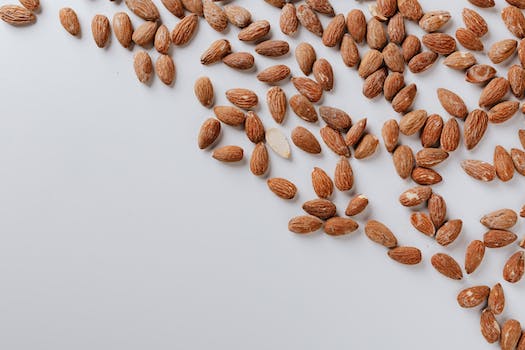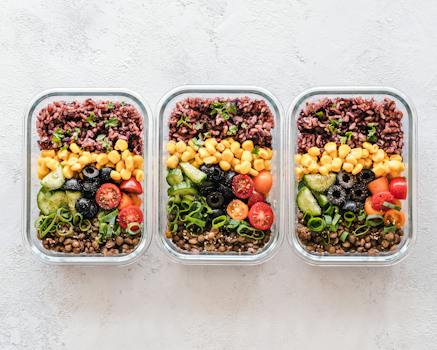
Incorporating Whole Foods into Your Diet: A Step-by-Step Guide is an informative article that aims to provide you with practical tips on how to introduce whole foods into your daily eating habits. Whole foods are natural, unprocessed foods that are rich in nutrients and offer numerous health benefits. By incorporating more whole foods into your diet, you can improve your overall well-being and achieve a balanced and nourishing eating plan. This guide will take you through a step-by-step process, helping you make small and sustainable changes to your diet that will have a big impact on your health.
- 1. Introduction
- 1.1. Understanding Whole Foods
- 1.2. Benefits of Incorporating Whole Foods into Your Diet
- 1.3. Importance of a Balanced Diet
- 2. Types of Whole Foods
- 2.1. Fruits and Vegetables
- 2.2. Whole Grains
- 2.3. Legumes and Pulses
- 2.4. Nuts and Seeds
- 2.5. Lean Proteins
- 3. Tips for Incorporating Whole Foods into Your Diet
- 3.1. Meal Planning and Preparation
- 3.2. Gradual Transition
- 3.3. Experiment with Recipes
- 3.4. Shop Mindfully
- 3.5. Avoid Processed Foods
1. Introduction
Incorporating Whole Foods into Your Diet: A Step-by-Step Guide
1.1. Understanding Whole Foods
Whole foods are unprocessed or minimally processed foods that are as close to their natural state as possible. They are typically free from additives, preservatives, and artificial ingredients. Whole foods include fruits, vegetables, whole grains, nuts, seeds, and lean proteins. These foods are rich in nutrients, vitamins, and minerals, and provide numerous health benefits. Incorporating whole foods into your diet can help improve digestion, boost energy levels, support weight management, and reduce the risk of chronic diseases. In this article, we will explore the importance of understanding whole foods and how to incorporate them into your daily meals.
1.2. Benefits of Incorporating Whole Foods into Your Diet
Incorporating whole foods into your diet can have numerous benefits for your overall health and well-being. Whole foods refer to natural, unprocessed foods that are free from additives, artificial ingredients, and preservatives. These foods are packed with essential nutrients, vitamins, minerals, and antioxidants that can nourish your body and support optimal functioning.
By including whole foods in your diet, you can enjoy the following benefits:
1. Improved Nutritional Intake: Whole foods are rich in nutrients, including fiber, healthy fats, protein, vitamins, and minerals. By consuming a variety of whole foods, you can ensure that you are getting a wide range of essential nutrients that are necessary for your body’s proper functioning.
2. Enhanced Digestive Health: Whole foods are often high in dietary fiber, which aids in digestion and promotes a healthy gut. Fiber helps regulate bowel movements, prevents constipation, and supports a diverse and balanced gut microbiome.
3. Increased Energy Levels: Whole foods provide a steady and sustainable source of energy due to their nutrient-dense nature. Unlike processed foods that are high in added sugars and unhealthy fats, whole foods provide a slow release of energy, keeping you energized throughout the day.
4. Weight Management: Whole foods are generally lower in calories compared to processed foods. By incorporating more whole foods into your diet, you can naturally reduce your calorie intake while still feeling satisfied. Additionally, the high fiber content in whole foods can promote feelings of fullness and prevent overeating.
5. Reduced Risk of Chronic Diseases: Whole foods, particularly fruits, vegetables, whole grains, and lean proteins, are associated with a lower risk of chronic diseases such as heart disease, diabetes, and certain types of cancers. The nutrients and antioxidants present in whole foods have protective effects on your body and can help maintain a healthy immune system.
In conclusion, incorporating whole foods into your diet can have significant benefits for your overall health. By making simple and gradual changes to your eating habits, you can enjoy improved nutrition, better digestion, increased energy levels, weight management, and a reduced risk of chronic diseases. Remember to prioritize whole, unprocessed foods and make them a staple in your daily meals for optimal well-being.
1.3. Importance of a Balanced Diet
A balanced diet is crucial for maintaining good health and overall well-being. It provides the necessary nutrients, vitamins, and minerals that our bodies need to function properly. A balanced diet not only supports our physical health but also has a significant impact on our mental and emotional well-being.
A balanced diet consists of a variety of whole foods that provide a range of nutrients. These include fruits, vegetables, whole grains, lean proteins, and healthy fats. By incorporating these foods into our daily meals, we can ensure that our bodies receive all the essential nutrients they need.
One of the key benefits of a balanced diet is that it helps to prevent chronic diseases such as obesity, diabetes, heart disease, and certain types of cancer. Whole foods, in particular, play a vital role in maintaining good health. They are unprocessed or minimally processed foods that retain their natural nutrients and fiber content.
Whole foods are rich in vitamins, minerals, and antioxidants, which help to boost our immune system and protect against various diseases. They also provide a good source of dietary fiber, which aids in digestion and promotes a healthy gut. By incorporating whole foods into our diet, we can enhance our overall health and reduce the risk of developing chronic illnesses.
In conclusion, a balanced diet that incorporates whole foods is essential for maintaining optimal health. It provides the necessary nutrients and protects against chronic diseases. By making conscious choices to include whole foods in our meals, we can improve our overall well-being and lead a healthier lifestyle.
2. Types of Whole Foods
Whole foods refer to unprocessed and unrefined food items that are as close to their natural state as possible. They are rich in essential nutrients, vitamins, minerals, and fiber, making them highly beneficial for our health. Here are some common types of whole foods that you can incorporate into your diet:
1. Fruits and vegetables: Including a variety of colorful fruits and vegetables such as berries, leafy greens, citrus fruits, and cruciferous vegetables can provide a wide range of nutrients.
2. Whole grains: Opt for whole grains like brown rice, quinoa, oats, and whole wheat bread instead of processed grains. These are higher in fiber and offer more nutritional value.
3. Legumes: Beans, lentils, and chickpeas are excellent sources of plant-based protein, fiber, and various minerals.
4. Nuts and seeds: Almonds, walnuts, chia seeds, flaxseeds, and pumpkin seeds are packed with healthy fats, protein, and antioxidants.
5. Lean proteins: Choose lean sources of protein such as chicken, turkey, fish, tofu, and tempeh. These provide essential amino acids for muscle growth and repair.
Incorporating these types of whole foods into your diet can help improve your overall health and well-being. They provide a wide range of nutrients and contribute to a balanced and nutritious eating pattern.
2.1. Fruits and Vegetables
Fruits and vegetables are essential components of a whole foods diet. These natural sources of vitamins, minerals, and fiber are not only delicious but also offer numerous health benefits. When it comes to fruits, there is a wide variety to choose from, including berries, citrus fruits, tropical fruits, and more. Each fruit brings its unique combination of nutrients and flavors to the table. Similarly, vegetables come in different types such as leafy greens, cruciferous vegetables, root vegetables, and others. Incorporating a diverse range of fruits and vegetables into your diet ensures that you receive a wide spectrum of nutrients that promote overall well-being. Whether you enjoy them raw, cooked, or blended into smoothies, these whole foods will contribute to a balanced and nutritious eating plan.
2.2. Whole Grains
Whole grains are an essential part of a healthy diet. They are packed with nutrients, including fiber, vitamins, and minerals. Incorporating whole grains into your meals can provide numerous health benefits and help prevent chronic diseases.
There are several types of whole grains to choose from, each with its unique flavor and texture. Some common examples include brown rice, quinoa, oats, barley, and whole wheat. These grains can be easily incorporated into your diet by substituting refined grains with whole grain alternatives.
Whole grains are versatile and can be used in a variety of dishes. They can be cooked and served as a side dish or used as a base for salads, soups, and stir-fries. You can also enjoy whole grain bread, pasta, and cereals for a nutritious breakfast or snack.
When buying whole grains, it is important to check the labels and look for products that are labeled as ‘100% whole grain’ or ‘whole wheat.’ This ensures that you are getting the full nutritional benefits of the grain.
In conclusion, adding whole grains to your diet is a simple and effective way to improve your overall health. By making small changes and incorporating whole grains into your meals, you can enjoy the benefits of a balanced and nutritious diet.
2.3. Legumes and Pulses
Legumes and Pulses
Legumes and pulses are an essential part of a whole foods diet. These plant-based sources of protein are packed with nutrients and offer numerous health benefits. Legumes include beans, lentils, chickpeas, and peas, while pulses refer specifically to dried seeds like lentils, split peas, and chickpeas.
Adding legumes and pulses to your meals is a great way to increase your intake of fiber, protein, vitamins, and minerals. They are also low in fat and cholesterol-free, making them a heart-healthy choice.
Incorporating legumes and pulses into your diet can be as simple as adding them to soups, stews, salads, or grain-based dishes. You can also use them to make delicious spreads, dips, and veggie burgers.
Including legumes and pulses in your regular meals can help promote better digestion, improve blood sugar control, and support weight management. So, next time you plan your meals, don’t forget to include these nutritious and versatile foods.
2.4. Nuts and Seeds
Nuts and seeds are an essential part of a whole foods diet. Packed with nutrients and rich in healthy fats, these tiny powerhouses offer a wide range of health benefits. There are various types of nuts and seeds that you can incorporate into your daily meals for a nutritious boost.
Almonds, for example, are a popular choice. They are packed with protein, fiber, vitamin E, and healthy fats. Walnuts, on the other hand, are rich in omega-3 fatty acids, which are beneficial for heart health. Pistachios are not only delicious but also provide essential nutrients like potassium and vitamin B6.
When it comes to seeds, chia seeds are a great option. They are loaded with fiber, omega-3 fatty acids, and antioxidants. Flaxseeds are another excellent choice, known for their high content of omega-3 fatty acids and lignans, which have been linked to reduced risk of certain cancers. Sunflower seeds are packed with vitamin E and magnesium.
Incorporating a variety of nuts and seeds into your diet can help improve your overall health and well-being. Whether you enjoy them as a snack, sprinkle them over salads, or add them to your smoothies, these whole foods are a delicious and nutritious addition to any meal plan.
2.5. Lean Proteins
Lean proteins are an essential component of a healthy diet. They provide the body with important nutrients, promote muscle growth and repair, and help to keep you feeling full and satisfied. When incorporating whole foods into your diet, it’s important to choose lean protein sources that are low in saturated fats and high in nutrients.
There are several types of lean proteins that you can include in your meals. One option is poultry, such as chicken or turkey breast, which is a great source of lean protein. Other lean protein options include fish, such as salmon or tuna, which are rich in omega-3 fatty acids. Lean cuts of beef, such as sirloin or tenderloin, are also a good choice.
In addition to animal-based proteins, there are also plant-based options that are high in protein and low in fat. These include legumes, such as lentils or chickpeas, which are not only a great source of protein but also high in fiber. Tofu and tempeh are other plant-based protein sources that you can incorporate into your meals.
When planning your meals, try to include a variety of lean proteins to ensure that you’re getting all the essential amino acids that your body needs. This will help to support muscle growth and repair, as well as promote overall health and wellbeing.
3. Tips for Incorporating Whole Foods into Your Diet
Incorporating whole foods into your diet can have numerous benefits for your health and well-being. These unprocessed foods are rich in nutrients, fiber, and antioxidants, which can help prevent chronic diseases and promote overall wellness. If you’re looking to make the switch to a whole foods diet, here are some tips to help you get started:
1. Start with small changes: Instead of completely overhauling your diet, start by making small changes. For example, replace processed snacks with fresh fruits or swap out refined grains for whole grains.
2. Prioritize fresh produce: Make sure to include a variety of fresh fruits and vegetables in your meals. These colorful foods are packed with vitamins and minerals that are essential for good health.
3. Opt for lean proteins: Choose lean sources of protein such as chicken, fish, beans, or tofu. These options are lower in saturated fat and can provide valuable nutrients.
4. Read labels carefully: When shopping for packaged foods, read the labels and ingredient lists. Look for products that contain whole, recognizable ingredients and avoid those with added sugars, artificial additives, or preservatives.
5. Cook at home more often: By preparing your meals at home, you have more control over the ingredients and cooking methods. This can help you avoid processed foods and make healthier choices.
6. Plan your meals: Take some time each week to plan your meals and make a grocery list. This can help you stay organized and ensure that you have the necessary ingredients for whole food-based meals.
7. Stay hydrated: Don’t forget to drink plenty of water throughout the day. Hydration is important for overall health and can also help curb cravings for unhealthy snacks.
Incorporating whole foods into your diet may take some time and effort, but the benefits are well worth it. By making these small changes, you can improve your nutrition, support your immune system, and enhance your overall well-being.
3.1. Meal Planning and Preparation
Meal planning and preparation are essential when it comes to incorporating whole foods into your diet. By taking the time to plan your meals ahead of time, you can ensure that you have healthy and nutritious options available throughout the week. Here are some tips to help you successfully incorporate whole foods into your meal planning and preparation:
1. Start by making a list of whole foods that you enjoy. This could include fruits, vegetables, whole grains, lean proteins, and healthy fats. By identifying the foods that you like, you can easily incorporate them into your meal planning.
2. Plan your meals for the week. Take into consideration your schedule and any upcoming events or commitments. By planning ahead, you can ensure that you have the necessary ingredients on hand and avoid relying on unhealthy convenience foods.
3. Make a grocery list based on your meal plan. This will help you stay organized and ensure that you have all the ingredients you need. When shopping, try to stick to the perimeter of the grocery store where the whole foods are typically located.
4. Prep your ingredients ahead of time. Wash and chop your fruits and vegetables, cook your grains, and portion out your proteins. By doing this in advance, you can save time during the week and make it easier to throw together a healthy meal.
5. Cook in bulk. Consider making larger batches of certain meals or ingredients that can be used in multiple dishes throughout the week. This can help save time and ensure that you always have something healthy to eat.
6. Store your prepared ingredients properly. Invest in quality storage containers and label them with the contents and date. This will help keep your food fresh and organized, making it easier to grab and go when you need a quick meal.
By following these tips for incorporating whole foods into your meal planning and preparation, you can make healthy eating a seamless part of your routine. Remember to listen to your body and make adjustments as needed to meet your individual dietary needs.
3.2. Gradual Transition
Gradual Transition:
When incorporating whole foods into your diet, it’s important to take a gradual approach. Sudden and drastic changes can be overwhelming and difficult to sustain in the long run. Instead, aim for a slow transition by gradually adding more whole foods to your meals and snacks.
Start by replacing processed snacks with whole food alternatives. For example, instead of reaching for a bag of chips, opt for a handful of nuts or seeds. Swap sugary desserts for fresh fruits or homemade treats made with whole ingredients.
Next, focus on incorporating whole foods into your main meals. Add a variety of colorful vegetables to your salads, stir-fries, and soups. Experiment with different grains like quinoa or brown rice as a substitute for refined grains.
Additionally, consider making small changes to your cooking methods. Instead of deep-frying foods, try baking, grilling, or steaming them. These methods retain more nutrients and reduce the amount of added fats.
Remember, the key is to make gradual changes that align with your taste preferences and lifestyle. By taking it one step at a time, you’ll find it easier to adopt a whole foods-based diet and enjoy the numerous benefits it offers.
3.3. Experiment with Recipes
Experimenting with recipes is a great way to incorporate more whole foods into your diet. By trying out different recipes, you can discover new and exciting ways to enjoy the natural flavors and health benefits of whole foods. Here are some tips to help you get started:
1. Start simple: Begin by incorporating whole foods into your favorite dishes. For example, add fresh fruits and vegetables to your salads or use whole grain bread for your sandwiches.
2. Explore new ingredients: Whole foods come in a variety of forms, such as whole grains, legumes, nuts, and seeds. Try experimenting with different types of whole foods to diversify your meals.
3. Get creative with spices and herbs: Enhance the flavor of your whole food recipes by using a wide range of spices and herbs. They not only add taste but also provide additional health benefits.
4. Incorporate whole foods into snacks: Instead of reaching for processed snacks, opt for whole food options like raw nuts, fruits, or homemade energy bars.
5. Try out international cuisines: Explore recipes from different cultures that heavily rely on whole foods. This can introduce you to new flavors and expand your culinary horizons.
Remember, the key is to have fun and be adventurous in the kitchen. Experimenting with recipes will not only make your meals more enjoyable but also help you reap the numerous health benefits that whole foods offer.
3.4. Shop Mindfully
When it comes to shopping mindfully for whole foods, there are a few key tips to keep in mind. Firstly, it’s important to prioritize fresh, unprocessed foods. Instead of reaching for packaged snacks or meals, opt for fresh fruits and vegetables, whole grains, and lean proteins. Look for organic options whenever possible to minimize exposure to pesticides and other harmful chemicals.
Another tip is to read food labels carefully. Pay attention to the ingredients list and avoid products that contain artificial additives, preservatives, or excessive amounts of added sugars. Look for foods with simple and recognizable ingredients.
Additionally, shopping at local farmers markets or joining a community-supported agriculture (CSA) program can help you incorporate whole foods into your diet. These options often offer a variety of fresh, seasonal produce that is grown locally and sustainably.
Lastly, it’s important to plan your meals and make a shopping list before heading to the grocery store. This can help you stay focused on purchasing whole foods and avoid impulse buys of unhealthy snacks or processed foods. By being mindful of your shopping choices, you can easily incorporate more whole foods into your diet and reap the benefits of a nutritious eating plan.
3.5. Avoid Processed Foods
When it comes to improving your diet and overall health, one of the most important steps is to avoid processed foods. These foods are typically high in added sugars, unhealthy fats, and artificial ingredients, which can have negative effects on your body. Instead, focus on incorporating whole foods into your diet. Whole foods are foods that are in their natural state, unprocessed and unrefined. They are rich in nutrients, fiber, and antioxidants, and can provide numerous health benefits. Here are some tips to help you incorporate more whole foods into your daily meals:
1. Start by replacing processed snacks with whole food alternatives. Instead of grabbing a bag of chips or a candy bar, opt for fresh fruits, nuts, or homemade granola bars.
2. Cook meals from scratch using whole ingredients. Avoid using pre-packaged sauces, dressings, and marinades, as they often contain added sugars and unhealthy fats. Instead, experiment with homemade options using herbs, spices, and natural sweeteners.
3. Include a variety of fruits and vegetables in your meals. Try to eat a rainbow of colorful produce, as different colors indicate different nutrients. Aim to fill half of your plate with vegetables and include fruits as a healthy dessert or snack option.
4. Choose whole grains over refined grains. Replace white bread, pasta, and rice with whole wheat options, quinoa, or brown rice. These whole grains are higher in fiber and provide more sustained energy.
5. Don’t forget about protein. Incorporate lean sources of protein such as chicken, fish, tofu, or beans into your meals. These foods are not only rich in protein but also provide essential amino acids.
6. Stay hydrated by drinking plenty of water throughout the day. Avoid sugary beverages and opt for water, herbal tea, or infused water with slices of fruits or herbs.
By following these tips and making small changes to your eating habits, you can gradually incorporate more whole foods into your diet. Not only will this improve your overall health, but it will also provide you with a wide range of nutrients and help you maintain a balanced diet.
Conclusion
Incorporating whole foods into your diet is a simple and effective way to improve your overall health. By following this step-by-step guide, you can gradually introduce nutrient-rich foods into your daily meals. Start by setting goals, planning your meals, and making a grocery list. Then, focus on adding fruits, vegetables, whole grains, lean proteins, and healthy fats to your diet. Remember to stay hydrated and listen to your body’s needs. With dedication and consistency, you can enjoy the numerous benefits of a whole foods diet, such as increased energy, improved digestion, and a stronger immune system.


